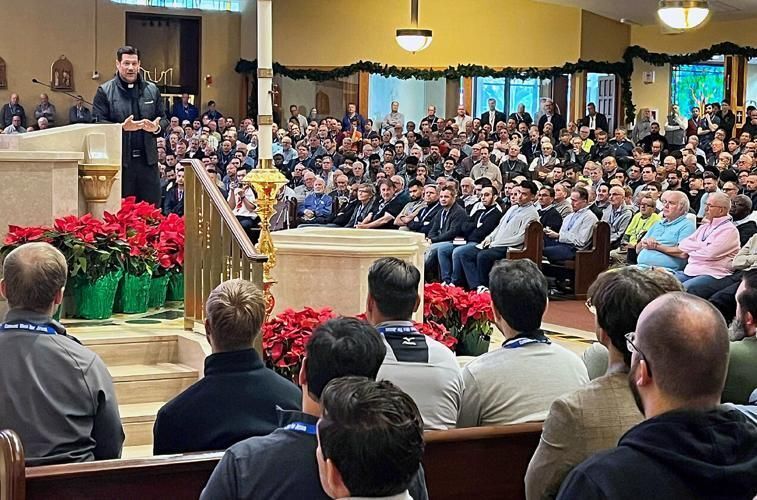
PALM BEACH GARDENS | It was smooth sailing as more than 1,350 Catholic men packed the Cathedral of St. Ignatius Loyola on Jan. 11 to hear popular Catholic speaker Father Mike Schmitz at the 24th annual Men’s Rally in the Diocese of Palm Beach.
Freshly disembarked from a cruise ship in Fort Lauderdale that was part of a special weeklong voyage for Catholics, Father Schmitz addressed a large group of men who were primed and hungry to hear his message.
Earlier activities at the rally included time for Eucharistic exposition and prayer, and listening to thoughtful presenters such as music legend Dion DiMucci, Army veteran Nathan Crankfield and movie producer Jimmy Wahlberg, along with emcee Mike Manhardt (see accompanying story).
Prior to Father Schmitz’s talk, rally organizers showed a 13-minute video on his ministry at the University of Minnesota in Duluth, which includes 60 weekly Bible studies for 2,000 students and 500 to 600 students attending Sunday Masses. The film makes the case that the current Newman Center is too small and needs to be expanded. He and his campus ministry program are in the midst of a $30 million fundraising drive to buy land that will expand its offerings. To learn more, visit https://bulldogcatholic.org/.
Beginning his talk, Father Schmitz asked the men to reflect upon this question: If I could be anywhere in the world doing anything right now, where would I want to be?
After giving them time to share their thoughts with others, Father Schmitz said he already knew their answers. About 95% will answer that they would rather be doing something else. “The reality, of course, is that God is pursuing every one of us, but he can only find us right here, and he can only find us right now. But if we’re spending all of our time wishing we were somewhere else, doing something else, how is he going to find us?” he said.
To illustrate his point, Father Schmitz spoke about Blessed Stanley Rother, who was in the seminary to become a missionary priest when he was advised to take a break from his studies and help his farming family in Oklahoma. Rother didn’t appreciate the break and thought then that he was wasting his time.
But when he did become a priest and was sent to Guatemala, Father Rother made a larger impact on the people there than any other priest, Father Schmitz said, “not because he had greater theological knowledge, not because he was a better preacher, not that he knew Spanish better, but because he knew how to farm, and so he taught the native people of Guatemala new farming techniques, and in that he was able to evangelize them and help them in a way that previous priests were not able to help them.
“What he could have seen as a deviation from God’s call in my life was actually the exact path that led to Blessed Stanley Rother” serving more people, he said. “He was not off track. Why? With God, nothing is wasted.”
Referring to the current popular trend of gathering bucket-list travel experiences instead of things, he urged the men to look at life a little differently.
“I would suggest that the story of your life is supposed to be not about what you accomplish, but who it is you become in the process,” Father Schmitz said. “At the end of your life, whether your life, my life, is going to be a heroic story or a tragedy, is not about what we get to accomplish, but about who we become. Whether your life is a love story or is a tragedy, is not about what you did. It’s about the kind of man you ended up as at the end.”
From that point, Father Schmitz concentrated on four markers or signs that a Catholic man has achieved manhood. As he said, “The four distinctive qualities that God wants every one of us to have,” starting with the desire to take responsibility for yourself and others.
As a campus minister for 20 years, people sometimes ask him: What do you want your students to be when they graduate?
His response is simple: “I want them to go in any environment and be able to take responsibility for their spiritual lives,” Father Schmitz said. “Until you and I become those kinds of men who are willing to take responsibility for our spiritual lives, we’re not actually men in the world. The first step is a choice to take responsibility for myself. And of course, we know it doesn’t end there. Take responsibility for someone else.”
His second mark of manhood is competence, the ability to be competent at something through training. Using the example of St. Paul and the desert fathers, who embraced self-denial and running the race to win, Father Schmitz encouraged the men to use their freedom and power to connect with God through Catholic practices of prayer and the sacraments.
Rebuffing the tendency among older men to respond, “That’s for the younger guys,” he said, “My older brothers, your story is not over, your race is not over. You’re the ones who show us how to run that last lap. You’re the ones who show us how to run that home stretch. Without you giving a witness, we don’t know what it looks like.”
The third characteristic of a Catholic man, Father Schmitz said, is to live with integrity. “If competence is the ability to do what I said I was going to do, integrity is doing what I said I was going to do,” he said.
To demonstrate the fourth mark of a Catholic man (to love like Jesus), Father Schmitz mentioned an email he received from a woman about her son moving toward entering the seminary. She was concerned that she was “losing” her son. In his reply, he pointed out to her that she didn’t send him to Catholic school so he could just be a nice guy. She prepared him so he could be like Jesus.
He told a story about a man in China who was arrested for having a Catholic Mass in his home 15 to 20 years ago. He was tortured for weeks to get him to divulge the identity of the priest. But he refused because he knew that the priest would be arrested, which would deny the Eucharist to so many others. After a few weeks, the police realized they couldn’t break him, so they sent him home.
“This man is a hero for the Eucharist. Can you imagine having that kind of competence, that kind of freedom and power, that integrity in that moment when all these things are running against you and crushing you and being able to say, ‘No, no, no. The Eucharist is the center. The Eucharist is the source. The Eucharist is the summit. I will not deny my Lord and not betray the Eucharist,’” he said.
The Chinese man eventually moved to the United States and rejoiced that he and his family didn’t have to fear religious persecution. But being here, he started to miss Mass because he was trying to get ahead and achieve material success. Now, after several years, he barely goes to Mass anymore.
“I want you to not miss this fact: What communist China couldn’t do, what torture couldn’t do, what burning cattle prods couldn’t do, our culture was able to do, and it didn’t even try,” Father Schmitz said. “He wasn’t targeted. He wasn’t attacked. He wasn’t persecuted. He just lived in exactly the same place that you and I live. This hero of the Eucharist now doesn’t even go to Mass.”
To be an exemplary Catholic man, he said, “we have to realize that we’re going to have to reject passivity, embrace responsibility. Be men of competence, freedom and power to be able to do the right thing. To have integrity to actually act when we’re called upon to act, and we have to love defiantly and live differently.
“There’s a culture that can break us without even trying unless we’re men who are on fire for the love of God.”
Bishop Gerald M. Barbarito, who attended the entire rally, presided at the closing Mass, with Father Schmitz as the homilist.
For more information on the rally’s sponsor, Catholic Men for Jesus Christ, visit https://www.catholicmenforjesusflorida.com/. To learn more about other events in the diocese, go to www.DiocesePB.org/news.

